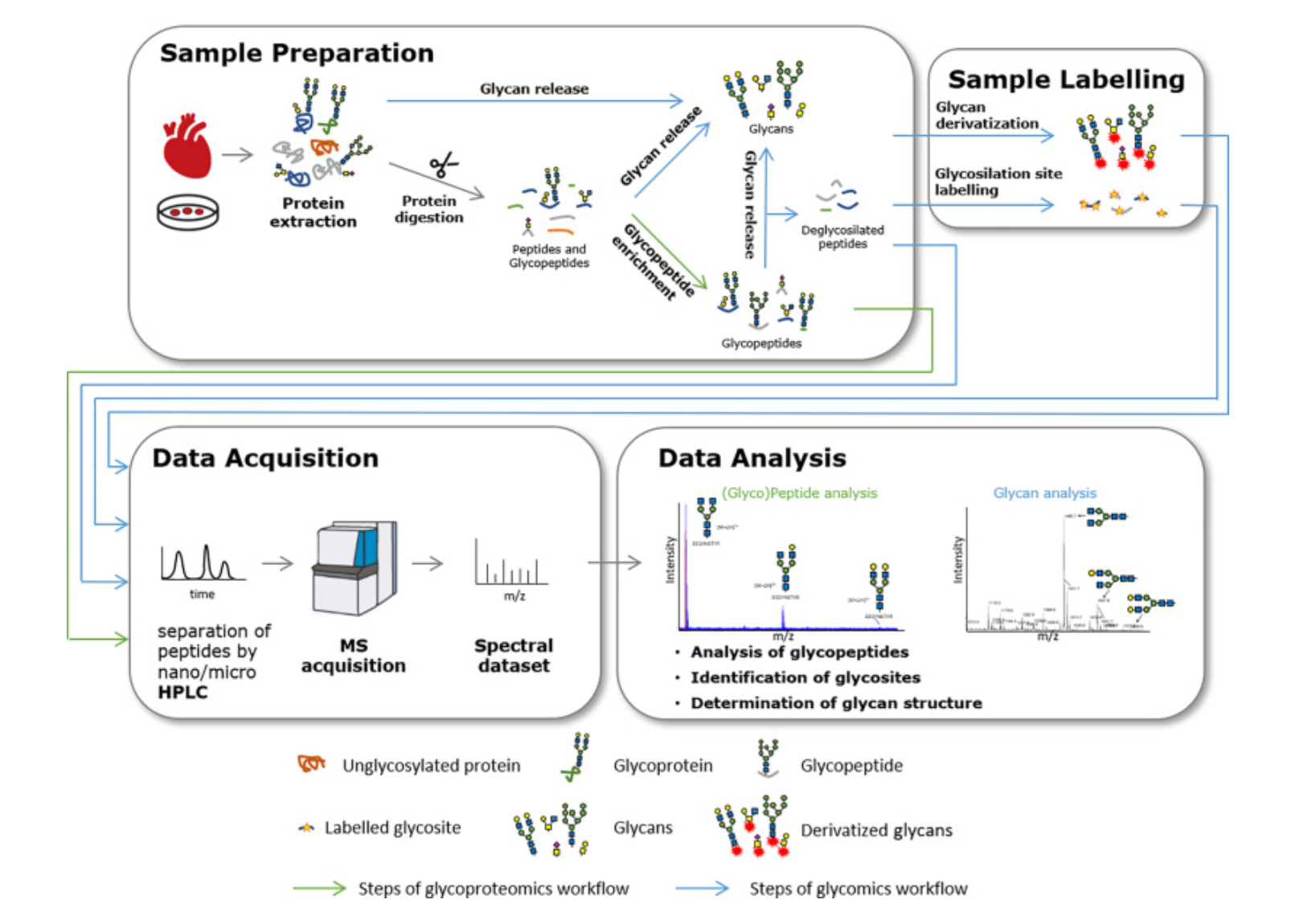Glycoproteomics Data Analysis Service
- Principal component analysis (PCA)
- Glycosylation heatmaps and site-specific bar charts
- Volcano plots of differential glycoforms
- Protein interaction network
- Protein subcellular localization
- Glycoprotein structural annotation diagrams
Glycosylation is one of the most complex and functionally diverse post-translational modifications (PTMs) in eukaryotic systems. It plays critical roles in protein folding, trafficking, stability, immunogenicity, and cellular signaling. Glycoproteins are central to numerous physiological and pathological processes, including immune response, cancer progression, pathogen recognition, and therapeutic protein development. Glycoproteomics, the large-scale study of glycosylated proteins, combines high-resolution mass spectrometry (MS) with bioinformatics pipelines to identify, quantify, and characterize site-specific glycosylation events. Glycosylation is heterogeneous, non-template-driven, and structurally diverse, posing major analytical and computational challenges. Accurate glycopeptide identification requires not only precise mass detection but also sophisticated data interpretation strategies to resolve complex glycan structures, isomers, and microheterogeneity.
To meet this need, MtoZ Biolabs offers a comprehensive Glycoproteomics Data Analysis Service which integrates advanced mass spectrometry data processing, glycopeptide search algorithms, custom glycan libraries, and multi-layered functional interpretation. Whether you're analyzing therapeutic glycoproteins, mapping glycosylation sites, or exploring glycan-related biological mechanisms, our team delivers robust, accurate, and biologically meaningful results.
Service at MtoZ Biolabs
MtoZ Biolabs' comprehensive glycoproteomics data analysis solutions are powered by deep domain expertise, robust data workflows, and flexible customization. Our service enables:
💠Raw data quality control
💠Accurate identification of N-linked and O-linked glycosylation sites
💠Site-specific glycan composition and occupancy profiling
💠Relative quantification of glycoforms across conditions
💠Glycoprotein domain analysis
💠Glycoprotein subcellular localization analysis
💠Glycoprotein interaction network analysis
💠Glycan structure profiling
💠Functional annotation and pathway mapping
💠Interactive data visualization and in-depth reporting
If you are not satisfied with the quality or results of your existing data, we also offer an all-in-one Glycoproteomics Analysis Service—from sample preparation and mass spectrometry analysis to comprehensive data interpretation—to ensure accurate identification of modification sites and high-quality data output.

Figure 1. General Workflows of Glycoproteomic and Glycomic Analysis of Protein Extracts Prepared from Biological Samples
Service Advantages
✔️Customizable Data Analysis: Tailored pipelines designed to meet specific project goals, glycoprotein types, and experimental designs.
✔️Transparent and Traceable Workflow: Fully documented analysis process with parameter tracking and quality control at every step.
✔️Experienced and Specialized Team: A dedicated team of glycoproteomics and bioinformatics experts with extensive project experience across research and biopharma.
✔️Secure and Confidential: All project data are handled under strict confidentiality protocols with secure data transfer and storage systems.
Applications
1. Therapeutic Glycoprotein Characterization
Support quality control, comparability assessment, and regulatory compliance for biotherapeutics such as monoclonal antibodies, fusion proteins, and glycoengineered biologics by providing site-specific glycosylation profiling.
2. Biomarker Discovery
Identify disease-associated glycoform patterns in clinical samples (e.g., plasma, serum, tissues) for cancer, autoimmune disorders, neurodegenerative diseases, and infectious disease diagnostics.
3. Functional Glycoproteomics
Reveal how specific glycosylation events affect protein function, stability, trafficking, and receptor-ligand interactions in biological systems.
4. Developmental and Stem Cell Biology
Track changes in glycosylation patterns during cell differentiation and reprogramming to understand glyco-mediated regulation of cell fate and developmental processes.
5. Glycoengineering and Synthetic Biology
Evaluate glycosylation outcomes in engineered cell lines, expression systems, or synthetic biology platforms to optimize glycoprotein production and function.
Deliverables
1. Raw Data Files
Original MS files and processed peak lists, if applicable.
2. Glycopeptide Identification Tables
Annotated lists of glycosylated peptides, glycan compositions, glycosites, and more.
3. Quantitative Profiles
Normalized abundance data, differential expression tables, and statistical metrics across sample conditions.
4. Functional and Pathway Analysis
GO enrichment, glycoprotein function classification, and KEGG pathway maps linked to glycosylation changes.
5. Visualization Outputs
6. Final Report
A detailed technical document describing the analytical workflow, parameters, data interpretation, and key findings. Optional consultation is available upon request.
Related Services
Glycosylation Site Analysis Services
Glycosylation Quantitative Proteomic Analysis Service
Glycoprotein Interaction Analysis Service
Phosphoproteomics Analysis Service
How to order?







